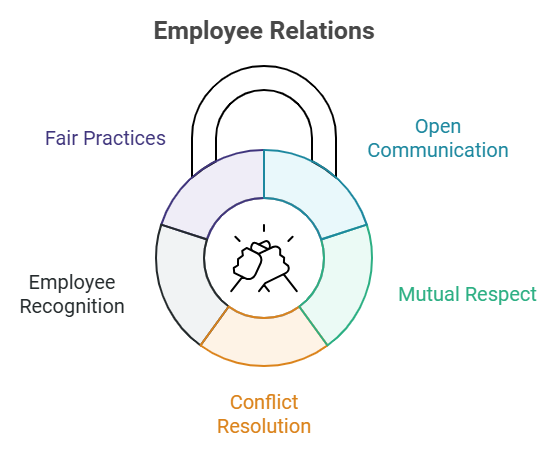
Employee relations is not just a cornerstone but the very foundation of a healthy workplace environment. In the dynamic and ever-evolving world of HR management, the ability to truly understand, nurture, and effectively manage these relations can spell the significant difference between a thriving, highly productive workforce and a disheartened, disconnected one.
This article takes a deep dive into the crucial role of employee relations, exploring its multifaceted implications for organizational health, sustained productivity, and harmonious work culture. By fostering strong and positive relationships between employees and management, organizations can create an environment where collaboration, open communication, and mutual respect thrive—ultimately leading to greater employee satisfaction, higher retention rates, and overall success.
Related articles:
How a Positive Workplace Experience Can Revitalize your Organization
Learn How to Engage Employees in Each Stage of the Employee Life Cycle
What is Employee Relations?
The term employee relations pertains to the continuous interaction between an organization’s management and its employees. This encompasses internal communication channels, interaction mechanisms, and conflict resolution processes that aim to uphold a positive and productive work environment.
By effectively managing employee relations, organizations can cultivate a culture of mutual respect, open dialogue, and team cohesion, which ultimately boosts employee morale, loyalty, and productivity.

Frequently Asked Questions about Employee Relations
Why is it important?
Employee relations is paramount in an organization as it fosters a healthy work environment, characterized by open communication, mutual respect, and clear conflict resolution mechanisms. Positive employee relations can lead to increased employee morale, motivation, and productivity, subsequently reducing turnover rates.
It also promotes a sense of fairness and equity amongst employees, leading to a more harmonious work culture. Additionally, effective employee management can enhance an organization’s reputation, making it a desirable place to work.
What role does it play in HR?
Employee relations plays a vital role in human resources management as it serves as the backbone of all interactions between an organization and its employees. It’s the HR’s responsibility to establish and maintain clear lines of communication, manage conflicts, and facilitate a positive environment based on mutual respect and understanding.
This aspect of HR management directly influences employee morale, job satisfaction, retention rates, and overall productivity. Moreover, effective employee management is key to fostering a culture of fairness and transparency, which is essential for the organization’s growth and success.
How does effective employee relations contribute to an organization’s success?
Effective employee relations significantly contributes to an organization’s success by creating an environment where employees feel valued and heard. This positive atmosphere helps in boosting their morale and productivity.
Moreover, a robust strategy reduces workplace conflict and promotes better partnership, leading to increased efficiency and improved organizational performance. It also aids in employee retention by creating a supportive and inclusive work environment.
Additionally, organizations with strong employee relations often have a better market reputation, attracting top talent. Ultimately, all of these factors combined drive the overall success and profitability of the organization.
What strategies can be utilized to strengthen employee relations?
First, fostering open communication is crucial. This includes not only sharing information about the organization’s goals and progress but also encouraging employees to voice their ideas, concerns, and feedback.
Secondly, recognizing and appreciating employees’ efforts and achievements can significantly boost morale and job satisfaction. This could be through regular feedback, rewards, or recognition programs.
Thirdly, investing in employee development and training shows that the organization values its employees and their growth. Organizing team retreats with the help of a professional team retreat planner can enhance team cohesion and strengthen workplace relationships in a more relaxed, engaging environment.
Finally, ensuring fairness and equality in all practices, including hiring, promotions, and benefits, promotes a sense of justice and trust among employees. In summary, a proactive, communicative, and inclusive approach can significantly strengthen employee relations.
In what ways does employee relations impact employee morale and productivity?
When employees feel valued, heard, and fairly treated, they are likely to exhibit higher morale. They are more motivated to perform their tasks, which ultimately leads to increased productivity.
Moreover, positive employee relations often result in a decrease in workplace conflicts, leading to a more harmonious environment that further boosts morale. Employees are more likely to collaborate effectively and contribute creative ideas when they feel secure and respected in their workplace.
On the contrary, poor employee relations can lead to lower job satisfaction, increased stress, and reduced loyalty to the organization, significantly lowering overall productivity.
Who is responsible for managing employee relations in an organization?
The responsibility of managing employees primarily falls on the organization’s HR department. HR representatives are responsible for creating policies that foster a positive work environment, addressing employee concerns, mediating conflicts, and implementing programs that promote employee well-being and satisfaction.
However, it’s also important to remember that maintaining positive employee relations is a shared responsibility. Managers and supervisors play a crucial role in implementing HR policies at the team level, and every employee has a part in contributing to a positive, respectful workplace culture.
What are some common challenges in maintaining positive employee relations?
Maintaining positive employee relations can be challenging due to several factors. One common challenge is communication, especially in larger organizations. Ensuring clear, consistent and transparent communication can be difficult but it’s critical in developing trust and understanding between employees and management.
Another issue is managing conflict. Disputes and disagreements are inevitable in any workplace, but if not handled properly, they can lead to a toxic environment. Balancing individual needs with organizational goals can also be tricky. Every employee has their own goals, expectations and needs from the workplace, and aligning these with the organization’s objectives often requires delicate balancing.
In these situations, bringing in a fractional COO can offer objective oversight and strategic structure without the cost of a full-time executive. Fractional COOs are especially effective in navigating transitional phases, helping standardize internal processes that support positive employee experiences while keeping operations aligned with business goals.
Lastly, keeping up with legal developments and changes in employment law can be a daunting task, yet it’s crucial in order to prevent the risk of legal issues and maintain a lawful, fair workplace.
How does conflict resolution factor in?
Conflict resolution involves identifying, addressing, and resolving conflicts in a fair, timely, and efficient manner. Conflicts can arise due to various reasons, including differing personal values, competition for resources, or misunderstanding of job roles. If not managed properly, these can lead to tension, decreased productivity, and a negative work environment. Effective conflict resolution strategies include open communication, mutual respect, active listening, and empathy. Managers should also be trained in conflict resolution techniques to help facilitate the process.
Furthermore, organizations should have clear policies in place for managing conflicts, allowing every employee to know how disputes are handled. Regular training and awareness programs can equip employees with the skills to resolve conflicts amicably and constructively, fostering a positive and harmonious workplace culture.
Can effective employee relations reduce employee turnover?
Absolutely, effective employee relations can significantly reduce employee turnover. When employees feel heard, valued and fairly treated, they are more likely to remain with the company. Employing strategies such as regular feedback sessions, recognition of good work, and fair conflict resolution not only enhances job satisfaction but also fosters loyalty.
Furthermore, clear communication about company policies and goals can help align employee expectations, reducing the chances of dissatisfaction and subsequent departure. Therefore, investing in robust employee relations strategies is a cost-effective approach to retaining talent and maintaining continuity in the workforce.
What role does communication play in employee relations?
Communication facilitates transparency and trust, providing a platform for employees to express their thoughts, ideas, and concerns. By encouraging open dialogue, organizations can identify and address issues promptly, thus reducing misunderstandings and fostering a healthy working environment. To support these efforts, get this 1-on-1 meeting with manager template to structure regular conversations and ensure employees feel valued and heard.
Moreover, effective communication helps align employees with the company’s vision, mission, and goals, promoting a sense of belonging and purpose. It also plays a crucial role in recognizing employees’ achievements and providing constructive feedback, further enhancing job satisfaction and employee retention. Therefore, both formal and informal communication mechanisms should be robust and actively utilized for optimal employee relations.
How can an organization measure the effectiveness of its employee relations?
Measuring the effectiveness of employee relations within an organization can be achieved through various quantitative and qualitative methods.
Quantitative metrics include turnover rates, employee satisfaction scores, and the number of grievances filed. A decrease in turnover rates and grievances, along with an increase in satisfaction scores, often indicates effective worker relations.
Qualitative measures can involve analyzing feedback from employee surveys or exit interviews, which provide insights into employee sentiment and perception of the organization. Additionally, the effectiveness of employee relations can be measured by examining the organization’s reputation as an employer in the market, which can be influenced by online reviews and ratings on platforms like Glassdoor.
Conclusion
Employee relations is vital in an organization for several reasons. First and foremost, it fosters a positive work environment, creating a space where employees feel valued, heard, and satisfied. This, in turn, leads to increased productivity as employees are motivated to perform their best.
Moreover, strong employee relations can result in decreased conflicts and grievances, leading to smoother operations within the organization. It also promotes loyalty and reduces turnover rates, saving companies the cost and resources associated with hiring and training new employees.
Lastly, effective employee relations can enhance the organization’s reputation, making it an attractive place for potential employees and a trusted partner for stakeholders. In essence, this is a pivotal aspect of an organization’s success, impacting its internal functioning and external image.




